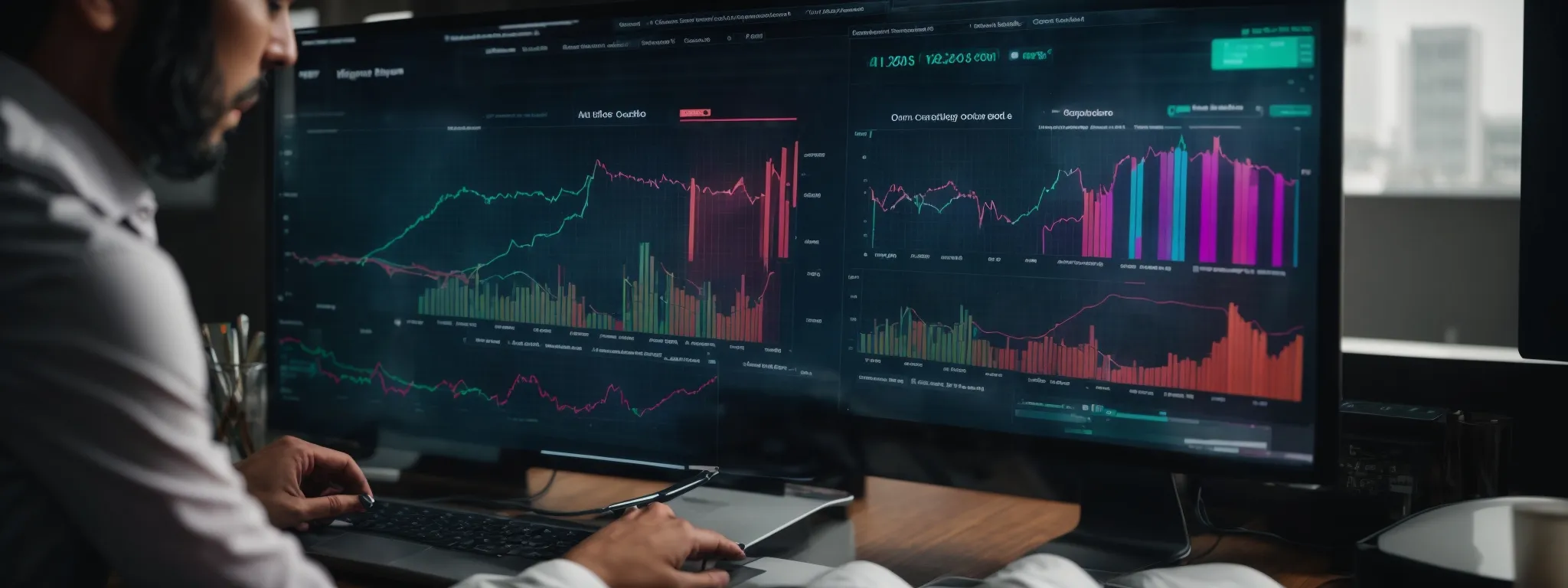Targeted Online Marketing Keywords
Maximizing Your Reach With Targeted Online Marketing Keywords In the dynamic landscape of digital marketing, the selection and utilization of targeted keywords are akin to setting the […]
Maximizing Your Reach With Targeted Online Marketing Keywords
In the dynamic landscape of digital marketing, the selection and utilization of targeted keywords are akin to setting the sails for a voyage through the vast online marketplace.
Mastering keyword targeting can not only bolster a business’s visibility but also ensure that the right audience is reached, driving traffic that is aligned with the intended market strategy.
With the multifold complexities of search engine algorithms, a strategic approach to keyword integration stands paramount in the competitive quest for digital recognition and conversion enhancement.
Keep reading to gain insights on how to transform the art of keyword targeting into measurable success.
Key Takeaways
- Strategic Keyword Targeting and Alignment With User Intent Are Essential for Effective Digital Marketing and Conversion Optimization
- Utilizing Advanced Keyword Research Tools Like SearchAtlas SEO Software Enhances Content Relevance and Improves Search Ranking
- Meticulous Integration and Readability of Keywords Within Digital Content Help Maintain User Engagement Without Compromising SEO Objectives
- Location-Specific Geo-Targeted Keywords Enable Businesses to Engage With Local Markets and Improve Regional Search Visibility
- Adapting Digital Marketing Strategies to Incorporate Seasonal Keyword Trends and Emerging Search Queries Ensures Relevance and Competitive Edge
Understanding the Power of Keyword Targeting

The landscape of digital marketing is one of constant evolution, a terrain where precise keyword targeting becomes indispensable for businesses looking to thrive.
A robust marketing strategy hinges on the identification of one’s core audience, a task that takes on greater nuance when considering the varied and often unpredictable search patterns of customers.
To navigate this complexity, organizations must align their content with extreme precision, crafting their messages to resonate with the specific needs and search behaviors of their intended audience.
This approach doesn’t merely attract visitors; it connects with them, fostering engagement and, ultimately, conversion.
Whether it’s through SEO Content Assistant or a meticulously planned PPC campaign, the integration of keyword research tools and strategic content planning cannot be understated in its ability to refine and tailor a company’s digital presence.
Identifying Your Core Audience
Grasping the intricacies of one’s target market stands at the foundation of any successful digital marketing endeavor. firms must deploy vigilant analysis and utilize advanced data interpretation methods to gauge the specific interests, challenges, and search habits of their intended customer base.
Through such insights, a business can finetune its searchAtlas SEO software, aligning content with the genuine queries and needs that fuel a customer’s online exploration. This alignment is not only crucial for enhancing visibility but also for building a marketing strategy that strikes a chord with the precise segment it aims to reach.
Recognizing Customer Search Patterns
Digital marketing success often pivots on the ability of marketers to decode the complex tapestry of user search behavior. Analyzing search queries can reveal nuanced patterns – understanding whether the audience’s intent leans more toward immediate purchases or information gathering is a profound advantage for any campaign.
Insights gleaned from consumer search patterns empower marketing professionals to create content that aligns with user intent, thereby increasing the relevance of their digital PR services and ad strategies. Consistent refinement based on search behavior nurtures a strategic approach that can lead to improved search ranking and a more robust digital marketing footprint.
Tailoring Content With Precision
When it comes to making an impact with digital content, precision is not merely desirable but necessary. Content that is meticulously designed with the target audience in mind ensures relevancy and resonates more effectively, thereby enhancing the likelihood of customer engagement and, critically, conversion.
In the realm of digital marketing, SearchAtlas by LinkGraph stands out as a tool that aids businesses in sharpening their content strategy. By deploying the SEO Content Assistant, companies are able to optimize their content with strategic keyword integration, ensuring each piece is finely tuned to meet both the search engine’s criteria and the user’s expectations.
Crafting a Solid Keyword Research Strategy

Embarking on a keyword research venture is akin to laying the foundation for a towering skyscraper; one must start with a strategic blueprint to ensure the end result reaches the desired heights.
For marketers, this begins with crystallizing their marketing objectives, which dictates the framework from which every other decision emanates.
Once the goals are established, a thorough analysis of the competitive landscape is imperative to identify gaps and opportunities within the market, informing the selection of the most effective keywords.
To navigate this complex terrain, leveraging cutting-edge keyword research tools like SearchAtlas becomes invaluable, serving as compasses that point towards data-driven solutions that amplify reach and optimize digital marketing efforts.
Defining Your Marketing Goals
Setting clear marketing objectives is akin to charting a path through unexplored territory, offering direction and purpose in an often chaotic online environment. Any diligent marketing entity recognizes that without concrete goals, their digital marketing efforts may falter, causing campaigns to dissipate into the ether of the internet without making a tangible impact.
For those intent on succeeding in digital marketing, establishing goals provides a means to measure progress and define success. From enhancing brand awareness to boosting conversion rates, goal-setting allows a company to concentrate its endeavors on achieving specific outcomes, thus optimizing resource allocation and maximizing online visibility.
Analyzing the Competitive Landscape
An astute marketer is aware that crafting a potent SEO strategy necessitates a keen understanding of the competitive landscape. Knowing the strengths and weaknesses of competitors allows for a strategic positioning that can capitalize on market opportunities and carve out a unique space for a brand within the search engine results.
Utilizing tools like LinkGraph’s SearchAtlas, businesses gain a panoramic view of their market position alongside keen insights into competitor strategies. Such Advanced SEO Software aids organizations in fine-tuning their digital marketing tactics to better contend in the fierce online marketing arena.
Utilizing Keyword Research Tools
In the vast expanse of digital marketing, wielding sophisticated keyword research tools is tantamount to an artist selecting the right palette: it can transform a blank canvas into a magnet for the intended audience. SearchAtlas SEO software serves as the linchpin for this effort, offering a suite of analytics and resources for marketers to harvest high-potential keywords:
| Feature | Benefit |
|---|---|
| Keyword Difficulty Analysis | Focuses efforts on achievable targets |
| Competitive Keyword Insights | Identifies gaps in market coverage |
| Search Volume Data | Ensures significant potential traffic |
| LSI Keywords Suggestions | Enhances content relevance |
By implementing SearchAtlas’s cutting-edge tools to discover and evaluate prime keywords, companies position themselves to create content that aligns with user queries and maximizes online discoverability. The resulting precision in targeting is not merely about visibility; it is about establishing a vital connection with the consumer at the precise moment of their need.
Selecting Keywords That Drive Qualified Traffic

As businesses vie for prominence in the digital sphere, the importance of harnessing precise keyword strategies cannot be overstated.
The power of selecting the right keywords lies in their capacity to funnel not just traffic, but qualified traffic that is likely to engage and convert.
Recognizing the significance of this selection process, professionals must delve into the intricacies of long-tail keyword opportunities and the delicate equilibrium between search volume and relevancy.
Such careful consideration promises to elevate a company’s content, ensuring it connects with the right audience at pivotal moments in their online journeys.
Focusing on Long-Tail Keyword Opportunities
Long-tail keyword opportunities represent the intricate tapestry of specific user queries, crafting a pivotal bridge between user intent and content visibility. In stark contrast to broad terms, these longer, more precise keyword phrases carry the advantage of attracting an audience with a clearer intent, setting the stage for improved engagement and conversions.
Marketers prioritize long-tail keywords to tap into the less competitive yet highly focused segments of their target market. These keywords, often ignored by larger competitors, hold the key to niche market penetration, enabling businesses to connect authentically with their audience and bolster their SEO efforts with strategic acumen.
Balancing Search Volume With Relevancy
In digital marketing, the balance between search volume and relevancy is a crucial component of any keyword strategy. A marketer’s skill in striking this balance can mean the difference between attracting a broad audience and reaching the exact subset of consumers who are poised for conversion.
Consequently, when a digital marketing company, such as LinkGraph, leverages SearchAtlas SEO software, they are empowered to discern not only the magnitude of a keyword’s reach but also its alignment with the precise needs and intent of their target audience, thus improving the overall efficacy of their campaigns.
Integrating Keywords Seamlessly Into Content

In the dynamic world of online marketing, the art of weaving keywords into the fabric of content determines the resonance of a brand’s digital voice.
Optimal placement of keywords and maintaining readability are pillars of effective SEO, striking a fine balance between catering to the algorithms of search engines and offering value to the reader.
As digital marketing professionals chart the course for a brand’s narrative online, the strategic distribution of keywords throughout blog posts, product pages, and social media content is tactical, ensuring every sentence serves the duel pursuit of organic reach and reader engagement.
Optimal Placement of Keywords in Content
Mastering the optimal placement of keywords in content is a cornerstone of effective digital marketing. It demands a strategic approach, ensuring that keywords enhance the content’s relevance and searchability without compromising the natural flow of the narrative.
Professionals in digital marketing employ a Meticulous Tactic wherein keywords are embedded within the crucial elements of a webpage: the title tag, headings, and body text, as well as the meta description and URL. The objective is to capture both the algorithms’ attention and the interest of potential customers:
- Title Tag: Integrating the primary keyword to immediately signal content relevance to search engines and users.
- Headings: Dispersing secondary keywords throughout subheadings to structure content and boost on-page SEO.
- Body Text: Weaving both primary and LSI keywords organically into the narrative to maintain reader engagement and topical authority.
- Meta Description: Featuring keywords to summarize content accurately and entice clicks from the search results page.
- URL: Utilizing keywords to create clear, descriptive webpage paths that enhance user experience and SEO.
This deliberate placement is central to a company’s ability to improve its search ranking, drive traffic, and optimize its digital marketing strategy for maximum reach and engagement.
Ensuring Readability While Using Keywords
Ensuring readability in the integration of keywords is vital for sustaining a user’s attention while fulfilling SEO objectives. To achieve this delicate equilibrium, digital marketing specialists at LinkGraph adapt their content to incorporate keywords sensibly, thus preserving the text’s organic appeal. Using the SEO Content Assistant, they generate copy that effortlessly marries keyword optimization with the natural cadence of language, so users remain engaged, and the narrative flows smoothly.
The process of maintaining readability is a subtle art, as keywords must be incorporated without unsettling the prose’s fluidity. This is where LinkGraph’s expertise becomes particularly beneficial, guiding the content creation in a way that respects both the nuances of language and the demands of search engine algorithms. Such a balanced approach ensures that each article stands as a beacon of user-centric content, underpinned by meticulous keyword research and strategic placements.
Measuring Keyword Effectiveness and ROI

In the digital marketing arena, the success of keyword deployment extends beyond mere implementation; the true measure of efficacy lies in a business’s ability to track and analyze the impact of chosen keywords.
For professionals in the field, this involves a vigilant monitoring of keyword rankings over time, coupled with a rigorous assessment of keyword-driven conversions through analytics.
Together, these practices paint a comprehensive picture of return on investment (ROI), allowing companies to pinpoint the strengths of their keyword strategy and identify areas ripe for optimization.
Tracking Keyword Ranking Over Time
Assiduously monitoring keyword rankings over extended periods is pivotal for discerning the health and trajectory of a marketing campaign. Businesses utilizing SearchAtlas by LinkGraph benefit from a systematic approach to tracking, which reveals whether their keywords ascend or falter in search ranking positions and delivers actionable insights into performance fluctuations.
With the precise analytics provided by SEO software, a digital marketing agency can quantify the direct impact of their keyword strategy, associate keyword progress with implemented changes, and assess the long-term trends that influence their visibility online. This continuous measurement is imperative for adapting strategies and fostering sustained online growth.
Using Analytics to Assess Keyword Conversions
Leveraging analytics is critical for deciphering the true return on investment (ROI) of keyword strategies within the digital marketing domain. By tracking which keywords are driving conversions, companies can validate the effectiveness of their marketing campaigns and determine where to allocate resources for maximum impact.
This granular approach to analytics offers a clear view of which keywords transform users into customers, sheds light on the customer journey, and assists in refining digital marketing tactics for improved results:
| Keyword | Conversions | Conversion Rate | ROI |
|---|---|---|---|
| Keyword A | 120 | 3.5% | 150% |
| Keyword B | 80 | 2.8% | 125% |
| Keyword C | 60 | 4.1% | 160% |
Furthermore, by pairing conversion data with metrics such as click-through rate (CTR) and average cost per click (CPC), organizations can calibrate their keyword bids and content strategies to improve the cost-efficiency and effectiveness of their digital advertising efforts.
The Role of Keywords in Conversion Optimization

In the digital hothouse where competition for consumer attention reaches fever pitch, the strategic use of online marketing keywords becomes the nexus between browsing and conversion.
The mastery of this tactic ensures that every click carries the potential to escalate into meaningful action.
Aligning keywords with user intent and embedding compelling calls to action are pillars upon which successful conversion optimization rests.
They transform passive interest into active engagement, signaling the deep understanding an enterprise must foster to draw customers further into the folds of their brand narrative.
Aligning Keywords With User Intent
Aligning keywords with user intent is the crux of driving transformative marketing outcomes. As digital marketing professionals develop campaigns, they are tasked with anticipating and reflecting the motivations behind search queries, thereby ensuring that the content not merely attracts visitors, but captivates an audience ready to take action.
This precise alignment necessitates a depth of understanding unique to every business’s target market. Effective keyword strategies go beyond surface-level metrics, delving into the psyche of the consumer to pair search terms with the underlying expectations and wishes that compel a user’s online search, ultimately fueling conversion optimization.
Crafting Compelling Calls to Action
In the intricate dance of digital conversion, a compelling call to action can transform even the highest-ranking keywords into tangible outcomes. A precisely crafted call to action harnesses the power of strategically selected online marketing keywords, channelling the intent these words embody into a clear, actionable directive for the audience.
The potency of a call to action lies not only in its language but its Strategic Placement within the digital narrative. When aligned with the right marketing keywords and embedded at pivotal points in the user’s journey, it effectively bridges the gap between user interest and their next step on the path to conversion:
| Keyword | Strategic Placement | User Interest | Call to Action |
|---|---|---|---|
| Organic Skincare | Top of Landing Page | Health-Conscious Buyers | Discover Your Natural Glow |
| Time Management Software | End of Blog Post | Busy Professionals | Start Saving Time Today |
| Home Workout Equipment | Footer of Email Campaign | Fitness Enthusiasts | Equip Your Space Now |
Leveraging Local SEO Keywords for Regional Reach

In an age where business boundaries extend far beyond physical storefronts, local SEO keywords become critical in ensuring that organizations make an indelible mark within their specific regional markets.
For companies targeting growth at a community level, deft application of geo-targeted keywords is paramount to capturing the essence of local consumer searches.
As the digital world continues to expand, the need for thorough research into the nuanced variances of location-specific terms intensifies—allowing businesses to harness the latent potential of regionally tailored online marketing strategies and carve out a dominant presence where it truly matters.
Understanding the Importance of Geo-Targeting
Geo-targeting represents a strategic cornerstone for businesses aiming to establish a strong foothold within local markets. By utilizing location-specific keywords, organizations can fine-tune their online presence to directly engage with a nearby audience, capitalizing on their proximity to drive foot traffic and foster community loyalty.
Incorporating geo-targeted keywords into online content elevates a company’s visibility in local search results, ensuring that their marketing efforts resonate with the regional nuances and demands of the community. This tailored approach not only boosts local search rankings but also significantly enhances the relevacy of content for the target consumer base:
- Improves search result accuracy for community-based users.
- Increases engagement and retention among local clientele.
- Drives localized traffic, both online and offline, to the business.
Researching for Location-Specific Keyword Variances
In the realm of digital marketing, delving into location-specific keyword variances demands both meticulous research and a keen understanding of linguistic nuances. Marketers targeting regional markets can enhance the effectiveness of their campaigns by identifying and incorporating variations of popular search terms that echo the local vernacular and search habits, thus ensuring greater alignment with the community’s online behaviors.
SearchAtlas’s SEO software emerges as an invaluable asset in pinpointing these regional keyword distinctions, empowering organizations to craft a more authentic and compelling online presence. By analyzing data trends and search volumes within specific locales, marketers can strategically adapt their keyword selection, adapting to regional colloquialisms and preferences which are crucial in elevating a brand’s regional search visibility and user relevance.
Utilizing Keyword Trends to Stay Ahead

In the realm of targeted online marketing, agility is tantamount to success.
Professionals recognize the transformative power of aligning their strategy with the ebbs and flows of keyword trends, which not only reflects consumer behavior but also the zeitgeist of search query evolution.
By adeptly tracking seasonal keyword trends and adapting to emergent search queries, businesses position themselves to seize market opportunities, ensuring their digital footprint remains prominent and proactive amidst the swiftly changing tides of internet marketing.
Tracking Seasonal Keyword Trends
Seasonal keyword trends are a dynamic aspect of digital marketing that savvy marketers cannot afford to overlook. Recognizing the patterns that come with holidays, seasons, or events enables businesses to align their content with the interests that surge during these specific times, driving timely traffic to their offerings and services.
By staying attuned to these shifts in the SearchAtlas SEO software, marketers can enact preemptive updates to their campaigns, ensuring they capitalize on increased search volumes. This foresight not only enhances visibility but also equips businesses with the agility to tap into the consumer’s seasonal mindset, ultimately optimizing engagement and conversion potential.
Adapting to Emerging Search Queries
In the dynamic world of digital marketing, staying abreast of emerging search queries is essential for marketers who wish to maintain a competitive edge. Companies must be vigilant, constantly surveying the digital horizon for fresh keywords that mirror evolving consumer interests and industry shifts to ensure their content remains relevant and authoritative.
Adapting to these emerging trends, organizations can leverage tools like SearchAtlas to seamlessly integrate new, high-traffic keywords into their content strategy. This nimble approach enables them to swiftly respond to market changes, thus securing enhanced visibility for their brand in the fast-paced environment of online search.
Advanced Techniques for Competitive Keyword Targeting

In today’s saturated online arena, advanced techniques for competitive keyword targeting are vital for businesses looking to maximize their digital footprint.
Delving into the Strategic Application of Semantic Keywords and the methodical deployment of keyword clustering can offer organizations the competitive edge needed to cut through market noise and connect with their audience.
This approach to online marketing entails not just identifying popular keywords, but tapping into the deeper context they reside within, and grouping them in ways that amplify a brand’s message across various digital channels.
Exploring the Use of Semantic Keywords
In the realm of competitive keyword targeting, semantic keywords stand as a beacon, guiding marketers towards a deeper understanding of language and context within their industry. These keywords, enriched with meaning and intent, enable businesses to refine their content, ensuring it resonates with search intent and aligns with the nuanced demands of their audience.
Employing semantic keywords involves analyzing and integrating terms related to the primary keyword, providing a comprehensive semantic net that search engines use to gauge content relevance and quality. This advanced technique not only bolsters SEO efforts but also amplifies the user’s experience by delivering content that speaks directly to their search context:
- Enhances content depth, covering a broader scope of related topics.
- Improves the match between search queries and content, increasing visibility.
- Strengthens the thematic signals sent to search engines, aiding in classification and ranking.
Implementing Strategic Keyword Clustering
As digital marketing becomes increasingly sophisticated, the technique of keyword clustering emerges as a critical component. By grouping semantically related keywords into clusters, businesses can create a more organized and targeted approach to content creation, effectively enhancing both their SEO performance and user relevance.
This strategic clustering enables marketers to address a spectrum of related search terms within a single piece of content or across a series of content pieces, improving the depth and breadth of topic coverage. Engaging with SearchAtlas’s advanced tools, organizations can implement strategic keyword clustering to drive focused and informed content strategies:
- Ascertain overarching themes from clusters to inform content pillars.
- Optimize individual web pages or blog posts around a tightly knit group of keywords.
- Strengthen internal linking structures with thematically relevant anchor text.
By applying strategic keyword clustering, companies are not just aligning with current best practices but are also preparing their digital marketing efforts for future search engine algorithm updates. The result is a robust strategy that delivers a meaningful, interconnected online experience for the user while bolstering search engine visibility.
Conclusion
Maximizing reach through targeted online marketing keywords is paramount for businesses in the competitive digital landscape.
It demands a deep understanding of the audience’s unique search behaviors and the strategic use of keyword research tools to identify and implement high-potential keywords.
By aligning content with user intent and integrating keywords with precision, companies not only enhance visibility but also forge meaningful connections with consumers to drive engagement and conversions.
Monitoring keyword effectiveness and continuously adapting to trends ensure that a company’s online presence is both dynamic and effective in converting interest into actionable results.
Furthermore, employing advanced techniques such as semantic keyword usage and keyword clustering can give businesses the edge they need to rise above the noise and meet their audience with relevant, compelling content.
Ultimately, leveraging the power of targeted keywords is crucial for a robust online strategy that captures qualified traffic and optimizes conversion rates.














































































